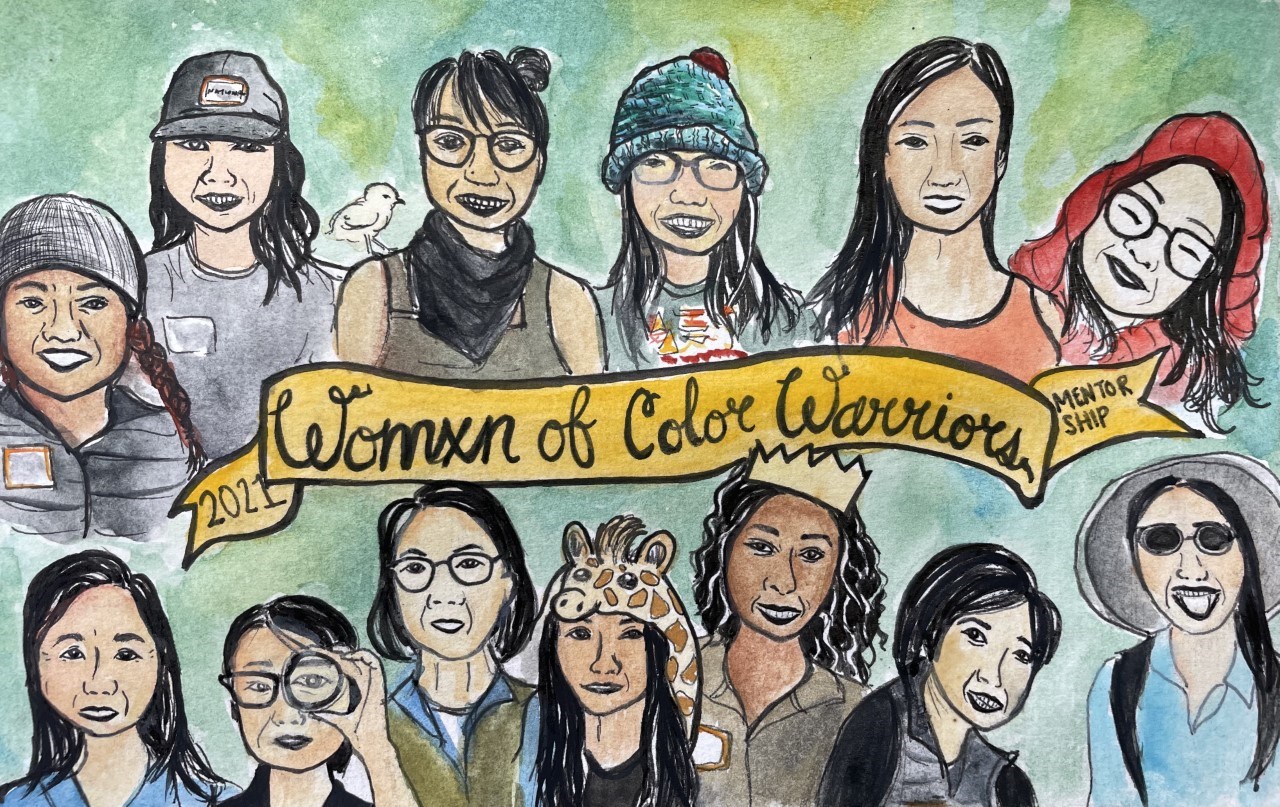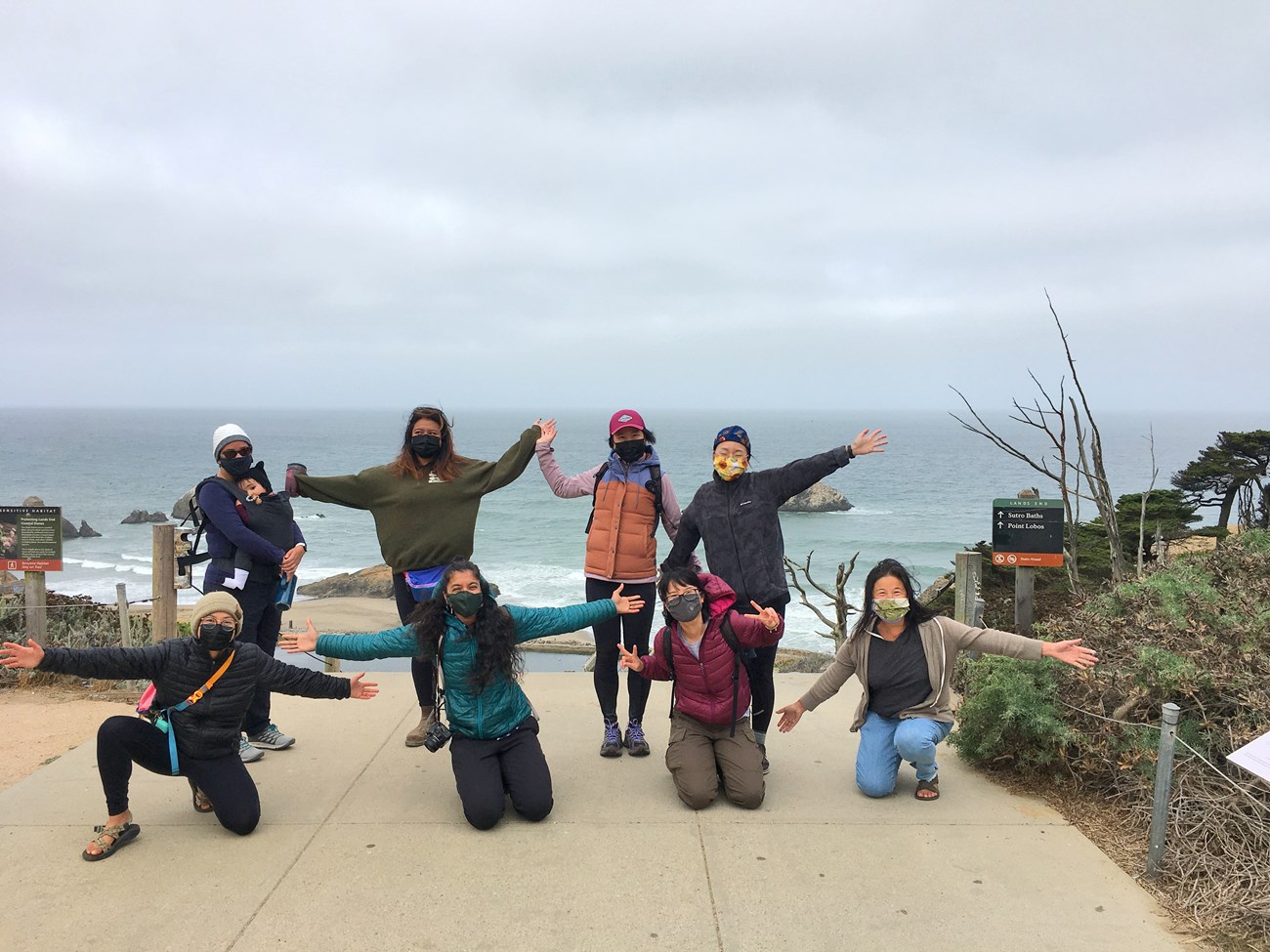Last updated: September 3, 2021
Article
Womxn of Color Mentorship Program Builds Lasting Bonds at the Parks Conservancy
Interview by Yakuta Poonawalla (Community Program Manager, Community Stewardship and Engagement) with Amy Tam (Youth Program Manager, Crissy Field Center) and Tessa Wei (Recruiter, Human Resources Department)

Painting by Amy Tam
“Honestly, I sat next to Deanna in the same office for so long and it wasn't until we entered the mentorship program where I really was given time to get to know her on a deeper level. She provided me a solid sounding board and made me feel so much less alone in my struggles. I appreciate the program very much for offering me the opportunity to connect with other womxn colleagues on a deeper level!!”
– Rebecca Au, Volunteer and Youth Programs Coordinator
August 2021 - In January, twelve staff from the Golden Gate National Parks Conservancy came together for a pilot online Womxn of Color (WOC) Mentorship Program. Initiated by Amy Tam, and co-designed by Tessa Wei, this program created a space like no other. A space that came to life by a sharing of inter-generational and multi-cultural stories and experiences of womxn, and what it means to grow up, get educated, have a career, and walk and move in a world that continues to be challenged by race and gender inequities.
As a colleague, mentor, friend and ally, I was witness to this sisterhood full of love, joy, care and support for each other. I hope that the reflections shared below by the facilitators and participants of this program will inspire you to build your own community and affinity space at work.
Yakuta (YP): What is the WOC mentorship group at the Parks Conservancy?
Tessa Wei (TW): In looking back, I originally saw the intent of the original program was more along the lines of a traditional and structured mentorship program geared towards WOC. The aim was to provide both professional and personal development for mentees. It would include building community, career development, learning new skills, gaining more knowledge of specific areas, developing additional insight, building relationships across the organization, etc.
Amy Tam (AT): The WOC mentorship group is an affinity space for womxn and non-gender binary folx to have a safe place to move beyond the solely professional conversations, to having real, vulnerable and raw sharing. It was a four-month long commitment where we were paired off one on one—mentor and mentee— and had biweekly commitments and monthly gatherings of the entire group. This space offered opportunities for us to share how we were feeling during the pandemic, listened to each other's challenges, and provided support through sharing music, recipes, books and ways of processing. This became a sacred space for sharing stories of our identities and ancestors. We built deep, meaningful, and supportive friendships with each other that transcended the four month-long commitment!
YP: What inspired you to create this mentorship group specifically for WOC?
TW: I recall a discussion during one of our Black, Indigenous and People of Color (BIPOC) Community Circles (a staff led space that was created for Parks Conservancy BIPOC staff to stay connected and build community during the pandemic and the nationwide racial justice uprisings). It was brought up that it was not easy for many BIPOC and WOC staff to grow and develop professionally and personally. Some of us never really had mentors who could provide some of the needed guidance on areas such as career development. Some of our parents were not able to help in these areas.
AT: I was initially inspired to create this space when I was a part of the Rising Leaders Fellowship—a 10 month fellowship to increase cultural relevancy and culture change within environmental and youth-serving organizations—run by what is now called Justice Outside. I felt a need to create a mentorship group because I was noticing that in much of my experiences at nonprofits, seasonal employees and people in lower positions had a hard time staying at the organization beyond seasonal contracts, let alone being able to find upward mobility. So, creating this, was really a selfish desire, that I knew could also support other people in a similar position. I wanted to pilot this cohort with womxn of color, because there is a disparity of opportunities for leadership and mentorship between womxn of color and white men.
YP: What were some of your challenges or barriers in creating and sustaining this group?
AT: One of the first challenges I faced in creating this group was learning who to reach out to, to share my idea, and to figure out how to implement this, while feeling silo-ed in my own department of the Crissy Field Center. There wasn’t any department that was responsible for professional development, mentorship, and equity of career growth. However, I received support and encouragement right from the beginning from our leadership and our HR Department. And with Tessa being a part of the HR Team and the Diversity, Equity and Inclusion (DEI) Committee, in addition to identifying as a womxn of color, I knew she’d make the perfect collaborator! Another challenge we faced was starting to envision this space, given all that was happening: a pandemic raging, 2/3 of our staff were furloughed, and devastating racial and social injustices happening around us. Yet, given all the challenges we were faced with, this was also a time when we probably needed this space the most.
TW: This was the first time we had such a program, so people were not aware of it. We had to get the message out about this new initiative and make sure that enough people were interested in order to make it work. We also had to estimate the time commitment involved for mentors/mentees/Amy/Tessa. In some ways, people did not know exactly what to expect. As Amy mentioned, there was so much happening within and outside the organization. Even though the HR department had a lot on their plate given the pandemic and the furloughs, and were themselves going through significant management changes, we were lucky to have a champion in Karen Rolfes, our Interim VP of HR. She understood the importance of such a program and was fully supportive. The idea of such a program resonated with me personally as a member of the DEI Committee, and also as a WOC with my own share of professional development challenges over the years. I am glad the HR Department and I had a role to play in this.

Amy Tam
"What was really special about this mentorship program is that we shared what we hoped we could learn from the other, not just about the workplace, skill-building, and networking but also our perspectives, values, and culture, which helped build deeper trust in and respect for each other, greater self-confidence and self-advocacy, and stronger voices, openness and honesty. I was always excited for our meetings!"
– Audrey Yee, Planned Giving Director
YP: What were your biggest takeaways of this group? What were some special experiences and unexpected outcomes?
AT: Some of the biggest learnings was listening to the needs of the participants and letting go of the culture of perfection. I wrote out intended program goals that focused on more hard skills because I needed to justify why it should exist. Yet, many of our participants wanted a space that was more well-rounded, focused on soft skills and building connection. After each meeting, we opened space for constructive feedback, and while there were some that helped shape the program, participants always ended with so much gratitude for the space! The process was beautifully emergent and co-creative. It helped me realize that we were all just grateful to have a safe space to gather and connect.
TW: The unexpected outcome was that this became less of a traditional, structured mentorship program. It became clear that there was a huge need for connectivity (social/personal/professional) and sisterhood. I don’t know if some of this was because this program was initiated and implemented during the height of the pandemic and with all the other changes that were going on. We provided flexibility to the structure of the program, and it evolved into something that participants said they gained a lot from.
YP: What advice do you have for people who want to start a similar group?
AT: Let go of the imposter syndrome of starting a group like this; there are plenty of people who likely share the need! Talk to as many people in leadership team, in Human Resources, in the Diversity Equity and Inclusion team, in communications team, and seek support through collaboration. This helped me feel less alone and made it feel collaborative and possible! Your efforts are important and regardless of your position, people will support and thank you for what you’re creating!
TW: Determine what the needs are. What are we trying to achieve with such a program? Should it be more of a traditional mentorship program, or should it be a different type of affinity space. Because of the pandemic, this program was all done virtually (except for a few socially-distanced mentor/mentee get-togethers). We used Zoom and Microsoft Teams meetings a lot which worked well, and Amy is such a great facilitator! The logistics and tools would obviously be very different if we did this all in-person. It would be great and perhaps even more fun if much of this could be done in-person.
“The WOC mentorship group provided a unique workplace community that offered anything from supporting each other in pay negotiation to resonance with non-traditional family structures. My mentor and I were able to bond over so many topics which gave depth to our professional and personal system.”
–Lealani Manuta, Education and Youth Media Specialist
For more information & inspiration
- Article: What does it look like to support women of color to lead?
- Podcast: Lessons for women of color on the rise
- Books: All we can save and All the women in my family sing
- Music: Raye Zaragoza
- Organizations to follow: Women’s Environmental Network, Women’s Earth Alliance, Native Women’s Wilderness and Trans Women of Color Collective
- Contact Amy Tam
